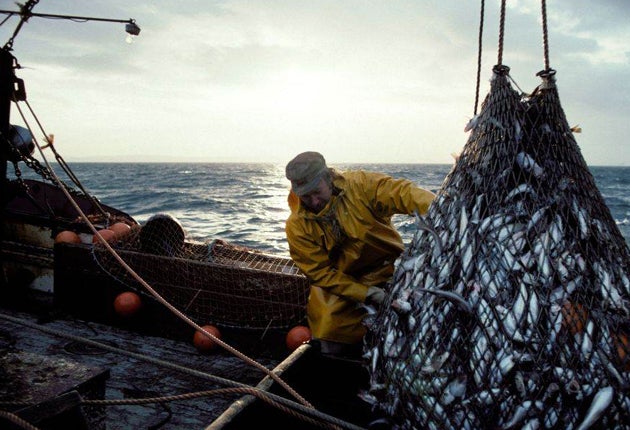North Sea fisheries madness
Outcry grows at 'ridiculous' waste of fishing catch

North Sea fishermen are throwing away up to half of all the fish they catch every year in what campaigners say is a chronic waste of food.
Almost a million dead and dying fish are discarded at sea each year, according to a campaign calling for Europe's Common Fisheries Policy (CFP) to be comprehensively reformed. Most are tossed overboard because they are too small, of the wrong species or will take fishing boats over their quotas, making it illegal to land them.
Hugh Fearnley-Whittingstall, the food campaigner and celebrity chef, was so appalled at learning of the level of discards, describing it as an "insane waste", that he has launched a campaign to get the practice banned.
Within two days of it being launched, more than 24,000 people signed up to Fearnley-Whittingstall's Fish Fight project and their names will be added to a letter to Maria Damanaki, the European Fisheries Commissioner, demanding the end of discards.
The chef launched his campaign to put pressure on the European Union to make the elimination of discards a "primary objective" when ministers sit down to reform the CFP. He said discards were "an unavoidable consequence of the Common Fisheries Policy and the quota system", adding: "The fish are being thrown away because to land them would be illegal."
The quantity of discards was highlighted as part of research for a television series Fearnley-Whittingstall is presenting, Hugh's Fish Fight, which is scheduled to be broadcast on Channel 4 early in the new year.
There are no precise figures on the levels of discards because they usually go unrecorded by fishermen, but it is generally accepted among experts that about a quarter of the tonnage taken in the North Sea is thrown back.
Professor Callum Roberts, of the University of York and a world authorities on fish stocks, said the claim that half of all fish caught in the North Sea are discarded is likely to be accurate. "It could even be more."
One species for which there are firm estimates of the number of fish, rather than the weight, is cod. Scientists at the International Council for the Exploration of the Seas calculated that more than 60 per cent are discarded in the North Sea, the figure rising to more than 90 per cent for cod aged less than a year.
Ministers and officials at the Department for Environment, Food and Rural Affairs (Defra) regard the CFP as "broken" and are anxious to reform it. Richard Benyon, the Fisheries minister, said: "The throwing back of dead fish into the sea is one of the biggest failures of the CFP. Both Hugh Fearnley-Whittingstall and I are pushing for the same thing. I am working to end this disgraceful practice that is forced on the fishing industry through a CFP that is clearly no longer fit for purpose."
Environmental groups have long called for the fishing industry to adopt equipment and practices that can substantially reduce bycatch – the unintended part of the catch such as juvenile cod when haddock are the target. Larger net mesh sizes is one measure that can save juvenile fish. Charles Clover, of the sustainable fishing organisation Fish2Fork, said: "It is splendid that an audience-puller like Hugh Fearnley-Whittingstall is getting stuck in to the problem of discards as it means that the public is about to find out a lot more about how their fish is produced – and a lot of what happens isn't pretty. It is ridiculous that we cannot prioritise more selective forms of fishing and stop throwing away hundreds of thousands of tonnes of perfectly good fish, let alone other creatures, every year. In America selective trawl gear and even hook fishing is much more widespread."
A government-backed initiative in the South-west, Project 50%, was recently praised by Ms Damanaki for halving the discard level in flat fish areas by using a new type of fishing gear on beam trawlers. Similarly in Scotland, the voluntary Conservation Credit Scheme has seen the bycatch rate plummet in a North Sea haddock fishery among species such as cod and whiting after new equipment and measures such as temporary localised fishing bans and CCTV on boats to monitor catches were adopted.
Incentives for fishermen are likely to become a common means of getting them to cut discard rates. In Denmark some fishermen have been given 30 per cent bigger quotas for demonstrating that their bycatch and discard rates have been slashed.
Pressure for reform of the CFP has been mounting and Ms Damanaki is developing proposals that she hopes will introduce an "intelligent stock management system for the 21st century" by 2013. The commissioner said yesterday: "I'm preparing a reform of the Common Fisheries Policy and the discards will get special attention. They have to be, wherever possible, avoided."
Join our commenting forum
Join thought-provoking conversations, follow other Independent readers and see their replies
Comments